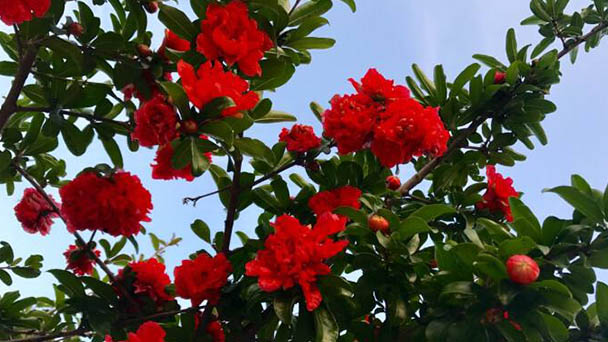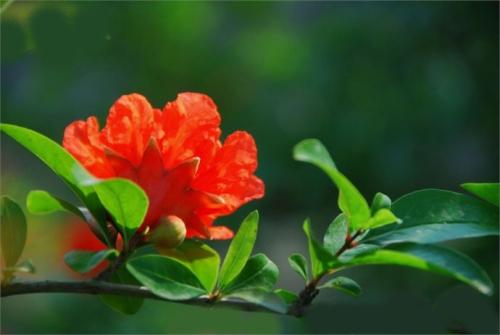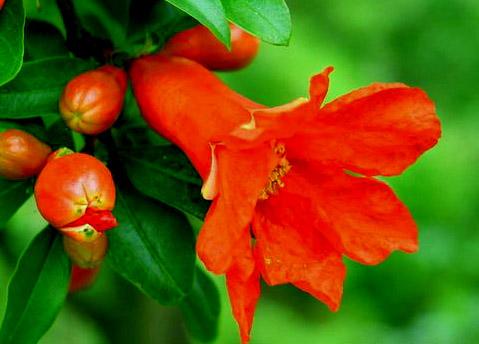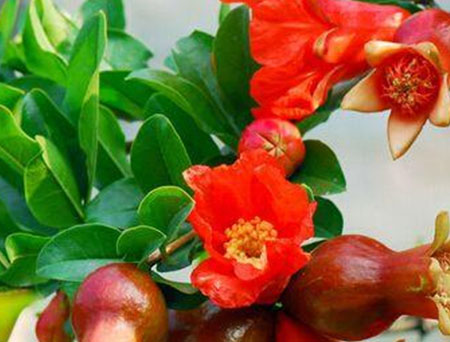Punicagranatum profile
Written by Maggie
Nov 18 2020

Punicagranatum is a deciduous shrub native to Iran and Afghanistan in Central Asia. Punicagranatum is the national flower of Libya in North Africa. It is also one of the city flowers in Zaozhuang City, Shandong Province, Shiyan City, Huangshi City, and Jingmen City in Hubei Province, Xinxiang City in Henan Province, Xi'an City in Shaanxi Province and Hefei City in Anhui Province.
Punicagranatum picture

Punicagranatum morphological characteristics
The height of Punicagranatum is 2~5m, and the highest can reach 7m. The trunk is gray-brown. Punicagranatum has flaky peeling, and the tender branches are yellow-green and smooth, often quadrangular, and the ends of the branches are mostly thorn-like without top buds. Single leaves are opposite or clustered, oblong or obovate, ranging from 2 to 8 cm in length, with smooth leaf surface, short stalk, and new leaves are green or bronze. A few flowers are born on the tops of branches or leaf axils. The flowers are bell-shaped, fleshy, 6-lobed apex, smooth and waxy, orange-red, persistent. The petals are 5 to 7 red or white, single or double.
Punicagranatum's suitable environment
Punicagranatum likes a sunny and dry environment, cold-tolerant, drought-tolerant, intolerant to waterlogging, intolerant to shade, and not strict to the soil. The best is fertile, loose and nutritious sandy loam.

Use value
Punicagranatum has both flowers and fruits. Small potted plants can be used for windowsills, balconies and living rooms. Large potted plants can be arranged in public places and conference venues. The ground pomegranate is suitable for the green configuration of scenic areas.
Punicagranatum has a long history as medicinal, and it is recorded in various ancient medical books.
Through clinical practice, physicians of the past dynasties believed that Punicagranatum has the effects of cooling heat, detoxification, strengthening the stomach, moisturizing the lungs, astringent intestines, and hemostasis.

Latest Updated
- Benefits of Bugleweed - 7 Science-backed Health Benefits
- Bugleweed Dangers & Side Effects - Is It Poisonous?
- How to Plant Evergreen Trees - What You Should Know
- When to Plant Evergreens - Grow Guide for Evergreen Trees
- 12 Wonderful Evergreen Shrubs for Your Garden
- 12 Popular Evergreen Plants with Pictures for Beginners
- When And How To Prune A Lilac Bush Like a Pro
- How to Grow & Care for Lilac Vine (Hardenbergia Violacea)
- Japanese Lilac Tree (Syringa Reticulata) Care & Propagation Guide
- Shumard Oak Pros and Cons - What to Know
Popular Articles
- Winter maintenance of Antirrhinum Majus
- How to Grow Terminalia Mantaly Tree
- How to Grow and Care for Crossostephium Chinense
- How to grow Antirrhinum Majus in spring
- Peristeria Elata (Dove Orchid) Profile: Info & Care Guide
- Underwatered Snake Plant (Sansevieria Trifasciata) - Signs And How To Fix
- How to Care for Brazilian Jasmine Plant (Mandevilla Sanderi)
- How to Grow & Care for Graptopetalum Purple Delight in Summer
- Rosa Chinensis (China Rose): Plant Growing & Care Tips
- How to Care for Baby Sun Rose (Aptenia Cordifolia)